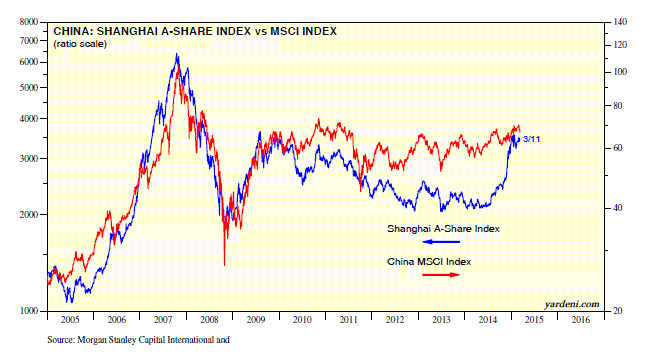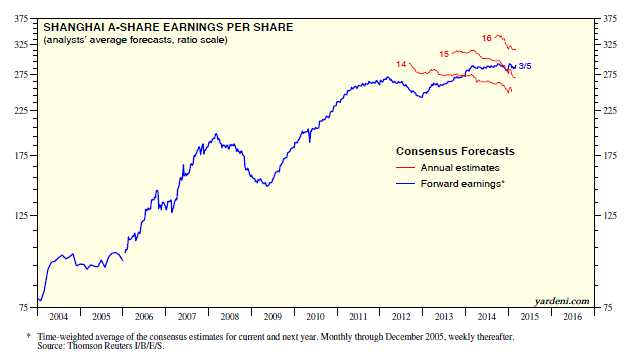
This is the Year of the Goat in China. This could be the year of the bull for stock investors given the big 32.8% gain in the Shanghai A-Share Index (in yuan) since November 14 of last year. However, the China MSCI stock index (also in yuan) is up only 3.2% over this period. Nevertheless, both are impressive gains given the concerns discussed above. Let’s have a closer look:
(1) Easy money. Global investors are on the prowl for another opportunity to win big as they did in Japan when Abenomics was introduced. They are looking for a weak economy that will force the central bank to ease. They’ve moved from Japan to the Eurozone over the past couple of years. Now they may be positioning for more gains in China.
Sure enough, the PBOC cut its official loan rate from 6.00% to 5.60% on November 21 last year, the first such move in two years. The one-year deposit rate was lowered from 3.00% to 2.75%. The central bank did it again on February 28, lowering by a quarter percentage point both the benchmark one-year loan rate, to 5.35%, and the one-year deposit rate, to 2.50%. At the beginning of February, the PBOC lowered bank reserve requirements.
(2) Foreign buying. Another reason why the Shangai A-Share Index soared is the fact that foreign investors were permitted to purchase shares of companies listed on the Shanghai Stock Exchange in mid-November of last year. Previously, only a select group of institutional investors who met certain qualifications had access to Shanghai's $2 trillion market.
(3) Locals buying. As the property market has cooled, more individual investors have turned to the stock market. The number of new stock accounts opened last week in China reached the highest level in five years, while in February, 20 new accounts were opened under the Qualified Foreign Institutional Investor (QFII) scheme, a sign of growing interest by foreign investors, state media reported yesterday.
(4) Relatively cheap. I calculated the forward P/Es for the MSCI and Shanghai A-Shares indexes. The former (which has 139 companies) is at 10.0, while the latter (which has 591 companies) is at 11.8. Those are relatively cheap valuation multiples compared to the MSCIs for the US (17.5), Eurozone (15.4), UK (15.4), and Japan (14.9).
At the end of February, the forward profit margin of the Shanghai A-Share was at 7.9%, while it was 3.6% for the MSCI. The forward earnings for both indexes have been relatively flat for the past year. In other words, it’s hard to get excited about either index based on earnings.
Today's Morning Briefing: Under the Dome. (1) Chai and Spielberg. (2) Pollution is a major health hazard in China. (3) “Maternity tourism.” (4) Premier Li’s state-of-the-nation speech. (5) Struggling to rebalance away from infrastructure to more consumption. (6) PPI deflation signals excess capacity. (7) Debt, corruption, and pollution all linked together in China. (8) Insane increase in bank loans. (9) Hard to breathe in China’s version of Heaven on Earth. (10) Utopians can be dangerous. (11) The Year of the Goat or the Bull? (12) Easy money attracting global investors. (13) China is relatively cheap, but earnings are flat-lining.

